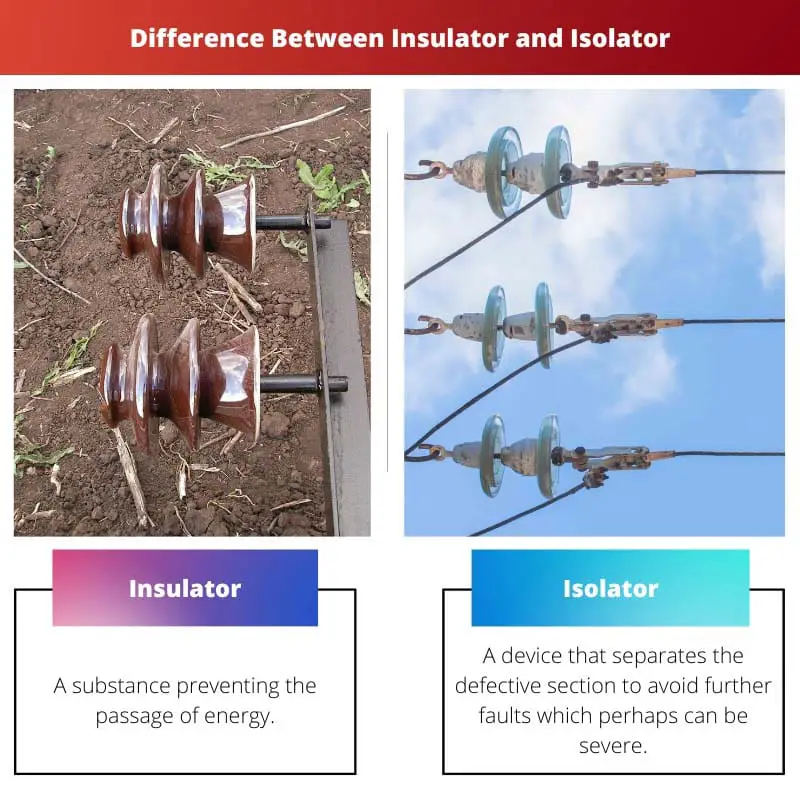Insulators and isolators are something that we used every day without knowing. The purpose of both insulator and isolator is the same, which is to prevent any risk from happening from electric current or heat.
One limits the amount of energy while the other becomes a wall to prevent the passing of energy. Though insulators and isolators serve a kind of similar purposes, they differ in some basic aspects.
Key Takeaways
- An insulator is a material that does not conduct electricity, while an isolator is a device that prevents electrical current from flowing between two points.
- Insulators are used to separate electrical conductors and prevent electrical discharge, while isolators are used in high-voltage electrical systems to isolate equipment.
- Insulators can be made of materials such as rubber, glass, or plastic, while isolators are ceramic or glass.
Insulator vs Isolator
In electrical engineering and physics, an insulator is a material that resists the flow of electric charge. Insulators have high electrical resistance. In the context of telecommunications, an isolator is a device that allows signals to travel in only one direction. Isolators are used to prevent interference in communication systems.

An insulator is any material or substance that prevents the transfer of energy such as heat, electricity, or cold. An insulator has low conductivity due to which the flow of energy is negligible.
Although insulators have poor conductivity, they can better be described as a material with high resistance to the heart or any kind of every.
An isolator is a mechanical switch that is operated manually for cutting off the faulty part of the substation. Isolators are used to separate the defective part from the working section to prevent any severe faults that can happen in the future.
Disconnector or disconnecting switch are the other names used for isolators and these are found in many forms for different applications.
Comparison Table
| Parameters of Comparison | Insulator | Isolator |
|---|---|---|
| Definition | A substance preventing the passage of energy. | A device that separates the defective section to avoid further faults which perhaps can be severe. |
| Function | It prevents the passing of heat or electricity through it. | It is used for isolating any conductor from its source of power. |
| What is it | Substances like plastic, glass, mica are highly resistant to current or heat. | A mechanical switch at both sides of the conductor. |
| Works as | Insulators work as a protector or barrier. | Isolators work as a switch that ensures isolation. |
| Use | To hold a conductor in place for separating it from others. | To stop the flow of energy to other parts by separating the energized part. |
What is Insulator?
An Insulator is anything that has the potential to stop the flow of electric current or heat.
Although these insulators are considered to be a non-conducting substances, they are better represented as a substance that has high resistance to the heat and flow of electric current.
The common use of an electrical insulator is to hold a conductor in its position while separating it from other conductors and the surrounding surfaces.
Insulators create a wall between the parts that have energy and restrict the amount of current that flows to the wires and other parts of a conductor as wanted.
The insulation of an electric circuit is necessary for the operation of all electronic and electric devices to be successful.
There are many materials available that can act as an insulator, and they are selected based on specific requirements needed for each application.
The electrical wiring of homes and industrial plants have a copper conductor in them which are separated from one another by rubber or plastic wrapped around them.
Large motors and generators that emit high temperature and voltage are insulated with mica. Porcelain insulators are used to support overhead power.
Sometimes, solid insulation is combined with the insulation of liquid or gas for some applications.
For example, in transforms with high voltage, solid insulation gives mechanical inflexibility, while liquid insulation which is the oil contributes to increasing insulation power and expelling heat from the conductor or equipment.

What is Isolator?
An isolator is defined as a mechanical switch that is used to separate a section of an electrical circuit when needed. These switches are used to open an electrical circuit in its no-load state.
The isolators are not supposed to be open when the electric current flows through. Generally, these isolators are attached on both sides of a circuit breaker due to which the repair of the circuit breaker is done without any issue or risk.
Isolators; as the name suggests, isolate any type of electrical element from its system when the system is in the offline or online state.
An isolator is also known as a disconnector.
It can be operated manually or automatically and sometimes employed with an earthing switch for grounding the portion of the equipment that has been separated from its system
to ensure the safety of that equipment and the person working on it. In electrical substations, switches with high voltage isolation are used for isolating apparatus like a circuit breaker, transformers, transmission lines, etc.
An isolator is not intended to control the circuit but is intended for safe isolation.
Unlike other load switches or circuit breakers, isolators do not have the mechanism to suppress electric arcs, which occurs when a conductor which is carrying a high electric current is disturbed.
This is why, isolators are made as off load devices, which have very low breaking capacity and are only intended to open after the current has been disturbed by another control device.

Main Differences Between Insulator and Isolator
- An insulator is a type is a material that does not allow any energy to pass through it whereas, an isolator is a switching device that is used to open or close a circuit.
- An insulator is used for holding a conductor in place while separating them from everything in the surroundings whereas, an isolator separates certain parts of equipment or conductor from its source of energy.
- An insulator works as a protector whereas, an isolator works as a switch.
- Insulators are not mechanical devices but substances like mica, plastic, rubber, glass, wood, etc, while isolators are the two-port mechanical device for transmitting radio frequency or microwaves in one direction.
- Insulators prevent the flow of energy which can cause damage by acting as a wall between them whereas, isolators ensure that the electrical circuit does not contain any energy while maintenance.

- https://www.osapublishing.org/abstract.cfm?uri=oe-20-2-1839
- https://www.osapublishing.org/abstract.cfm?uri=oe-24-12-12856

This article draws a clear distinction between insulators and isolators, offering detailed explanations of their functions and applications. However, it would benefit from a more critical evaluation of the potential limitations of these electrical components.
I agree with your perspective. Exploring the limitations and drawbacks of insulators and isolators would enhance the depth of this informative content.
The technical descriptions of insulators and isolators are presented with precision. It provides a comprehensive insight into their operational disparities.
The article delivers a comprehensive understanding of insulators and isolators. It provides significant clarity on the roles of each in electrical systems.
The comparison table effectively outlines the differences between insulators and isolators. It is an informative piece offering valuable knowledge about electrical components.
The explanation of insulators and isolators is insightful, shedding light on the variation between the two. However, the sources of this information and the credibility of this content should be critically examined.
I agree with your point on the importance of verifying the sources. It is crucial to evaluate the reliability of the information presented in the article.
The practical applications of insulators and isolators are well-discussed here. This content serves as a significant resource for understanding their functions.
The detailed comparison of insulators and isolators provides valuable insights. It clearly explains the distinction and functionality of each, making it an enlightening read.
It is interesting to learn about the differences between insulators and isolators as both serve similar yet different purposes. What is the source of this information? I’d like to read more on this topic.